初中英语易混动词辨析
- 格式:doc
- 大小:37.50 KB
- 文档页数:2
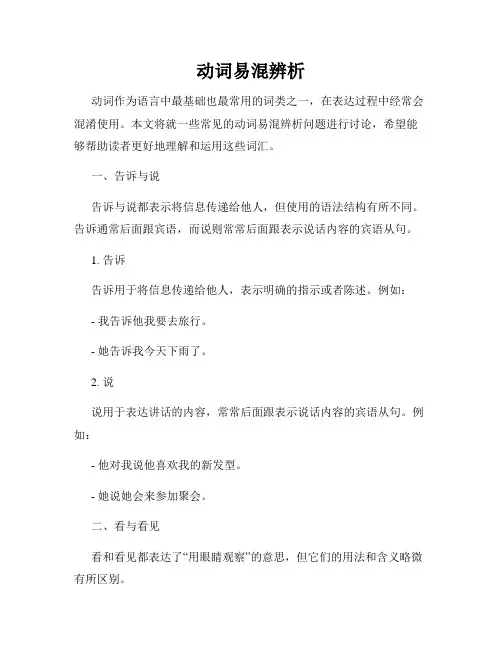
动词易混辨析动词作为语言中最基础也最常用的词类之一,在表达过程中经常会混淆使用。
本文将就一些常见的动词易混辨析问题进行讨论,希望能够帮助读者更好地理解和运用这些词汇。
一、告诉与说告诉与说都表示将信息传递给他人,但使用的语法结构有所不同。
告诉通常后面跟宾语,而说则常常后面跟表示说话内容的宾语从句。
1. 告诉告诉用于将信息传递给他人,表示明确的指示或者陈述。
例如:- 我告诉他我要去旅行。
- 她告诉我今天下雨了。
2. 说说用于表达讲话的内容,常常后面跟表示说话内容的宾语从句。
例如:- 他对我说他喜欢我的新发型。
- 她说她会来参加聚会。
二、看与看见看和看见都表达了“用眼睛观察”的意思,但它们的用法和含义略微有所区别。
1. 看看侧重于主动地用眼睛观察某物,强调的是动作本身。
例如:- 我在公园里看到了一只小狗。
- 他正在看电视节目。
2. 看见看见则更强调对眼前事物的感知,强调的是看到某物的结果和效果。
例如:- 我终于看见了望远镜里的行星。
- 她看见他吃完晚饭离开了。
三、知道与了解知道和了解都表示对某事或某物有所了解,但它们在程度和语义上有一定的区别。
1. 知道知道指对某事或某物有所认识,对信息的了解程度较浅。
例如:- 我知道他是个著名的作家。
- 她知道今天是她的生日。
2. 了解了解则表示对某事或某物有更深入的了解和认识。
它的程度和语义常常比知道强。
例如:- 我了解他的生平经历。
- 他全面了解该公司的运营情况。
四、决定与决心决定和决心都涉及到做决定或者下决心的意思,但两者的用法和语义有所差异。
1. 决定决定常常用于表示做出某种决策或抉择。
例如:- 我决定明天要去旅行。
- 他决定换个新工作。
2. 决心决心更强调的是一个坚定的意志和决策。
例如:- 她决心学好英语。
- 他下定决心要减肥。
五、希望与期望希望和期望都表示对未来的一种期待,但它们的用法和语义略有区别。
1. 希望希望常常用于对个人的期待和愿望。
例如:- 我希望明天天晴。
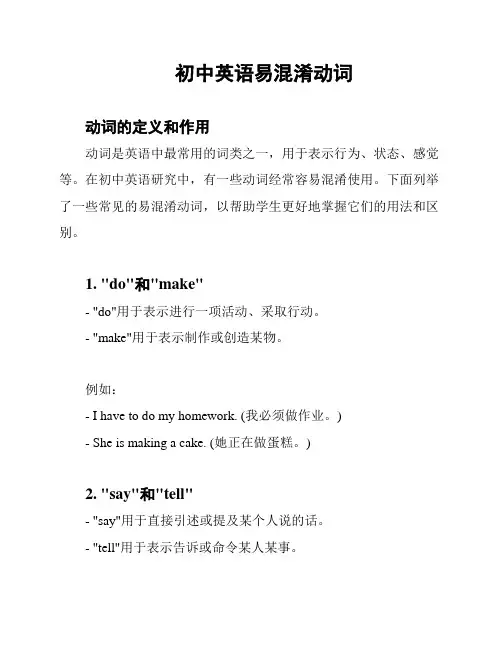
初中英语易混淆动词动词的定义和作用动词是英语中最常用的词类之一,用于表示行为、状态、感觉等。
在初中英语研究中,有一些动词经常容易混淆使用。
下面列举了一些常见的易混淆动词,以帮助学生更好地掌握它们的用法和区别。
1. "do"和"make"- "do"用于表示进行一项活动、采取行动。
- "make"用于表示制作或创造某物。
例如:- I have to do my homework. (我必须做作业。
)- She is making a cake. (她正在做蛋糕。
)2. "say"和"tell"- "say"用于直接引述或提及某个人说的话。
- "tell"用于表示告诉或命令某人某事。
例如:- He said, "I love you." (他说:“我爱你”。
)- Mom told me to clean my room. (妈妈告诉我收拾房间。
)3. "hear"和"listen to"- "hear"用于表示听到声音,但并不一定有意愿去听。
- "listen to"用于表示有意愿去倾听。
例如:- I heard a loud noise outside. (我听到外面传来一声巨响。
) - Please listen to me carefully. (请仔细听我说。
)4. "bring"和"take"- "bring"表示把物品带到与说话人的位置相对的位置。
- "take"表示把物品带离与说话人的位置相对的位置。
例如:- Can you bring me a glass of water, please? (你能给我拿杯水吗?)- Don't forget to take your umbrella when you leave. (离开时别忘了带上你的雨伞。
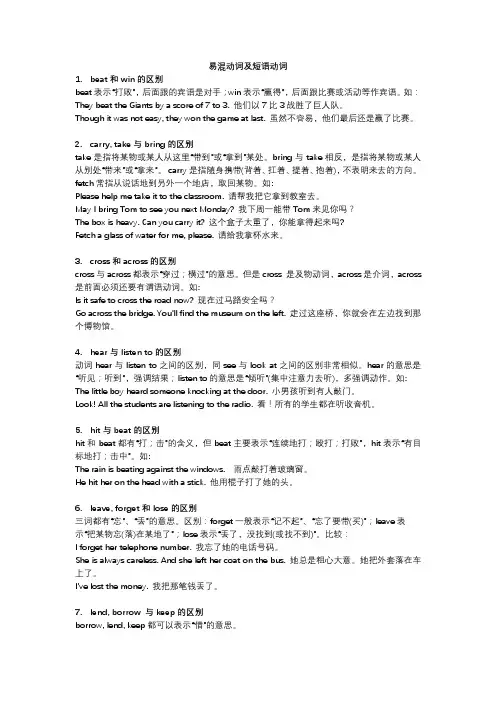
易混动词及短语动词1.beat和win的区别beat表示“打败”,后面跟的宾语是对手;win表示“赢得”,后面跟比赛或活动等作宾语。
如:They beat the Giants by a score of 7 to 3. 他们以7比3战胜了巨人队。
Though it was not easy, they won the game at last. 虽然不容易,他们最后还是赢了比赛。
2.carry, take与bring的区别take是指将某物或某人从这里“带到”或“拿到”某处。
bring与take相反,是指将某物或某人从别处“带来”或“拿来”。
carry是指随身携带(背着、扛着、提着、抱着),不表明来去的方向。
fetch常指从说话地到另外一个地店,取回某物。
如:Please help me take it to the classroom. 请帮我把它拿到教室去。
May I bring Tom to see you next Monday? 我下周一能带Tom来见你吗?The box is heavy. Can you carry it? 这个盒子太重了,你能拿得起来吗?Fetch a glass of water for me, please. 请给我拿杯水来。
3.cross和across的区别cross与across都表示“穿过;横过"的意思。
但是cross 是及物动词,across是介词,across 是前面必须还要有谓语动词。
如:Is it safe to cross the road now? 现在过马路安全吗?Go across the bridge. You'll find the museum on the left. 走过这座桥,你就会在左边找到那个博物馆。
4.hear与listen to的区别动词hear与listen to之间的区别,同see与look at之间的区别非常相似。
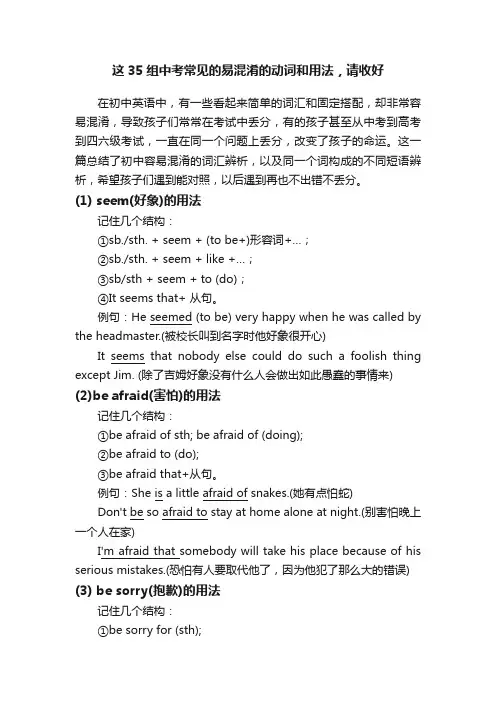
这35组中考常见的易混淆的动词和用法,请收好在初中英语中,有一些看起来简单的词汇和固定搭配,却非常容易混淆,导致孩子们常常在考试中丢分,有的孩子甚至从中考到高考到四六级考试,一直在同一个问题上丢分,改变了孩子的命运。
这一篇总结了初中容易混淆的词汇辨析,以及同一个词构成的不同短语辨析,希望孩子们遇到能对照,以后遇到再也不出错不丢分。
(1) seem(好象)的用法记住几个结构:①sb./sth. + seem + (to be+)形容词+…;②sb./sth. + seem + like +…;③sb/sth + seem + to (do);④It seems that+ 从句。
例句:He seemed (to be) very happy when he was called by the headmaster.(被校长叫到名字时他好象很开心)It seems that nobody else could do such a foolish thing except Jim. (除了吉姆好象没有什么人会做出如此愚蠢的事情来) (2)be afraid(害怕)的用法记住几个结构:①be afraid of sth; be afraid of (doing);②be afraid to (do);③be afraid that+从句。
例句:She is a little afraid of snakes.(她有点怕蛇)Don't be so afraid to stay at home alone at night.(别害怕晚上一个人在家)I'm afraid that somebody will take his place because of his serious mistakes.(恐怕有人要取代他了,因为他犯了那么大的错误) (3) be sorry(抱歉)的用法记住几个结构:①be sorry for (sth);②be sorry for (doing sth);③be sorry to (do);④be sorry that+从句。
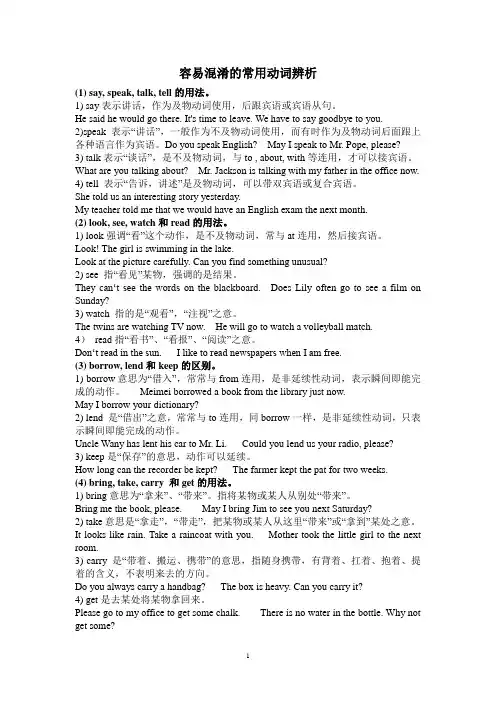
容易混淆的常用动词辨析(1) say, speak, talk, tell的用法。
1) say表示讲话,作为及物动词使用,后跟宾语或宾语从句。
He said he would go there. It's time to leave. We have to say goodbye to you.2)speak表示“讲话”,一般作为不及物动词使用,而有时作为及物动词后面跟上各种语言作为宾语。
Do you speak English? May I speak to Mr. Pope, please?3) talk表示“谈话”,是不及物动词,与to , about, with等连用,才可以接宾语。
What are you talking about? Mr. Jackson is talking with my father in the office now.4) tell 表示“告诉,讲述”是及物动词,可以带双宾语或复合宾语。
She told us an interesting story yesterday.My teacher told me that we would have an English exam the next month.(2) look, see, watch和read的用法。
1) look强调“看”这个动作,是不及物动词,常与at连用,然后接宾语。
Look! The girl is swimming in the lake.Look at the picture carefully. Can you find something unusual?2) see 指“看见”某物,强调的是结果。
They can‘t see the words on the blackboard. Does Lily often go to see a film on Sunday?3) watch 指的是“观看”,“注视”之意。
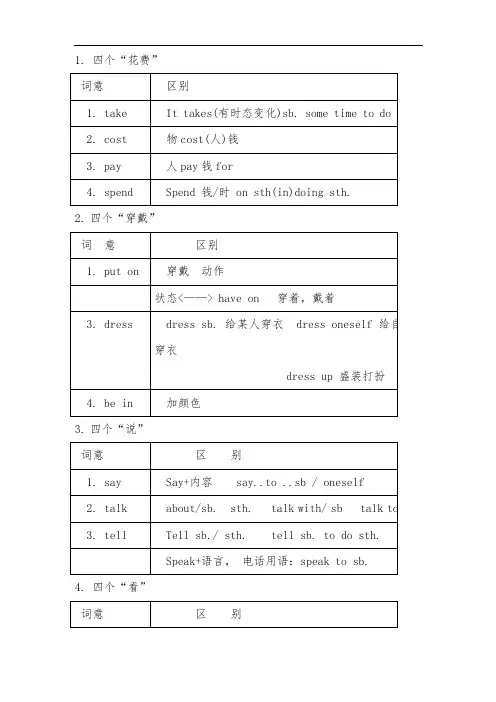
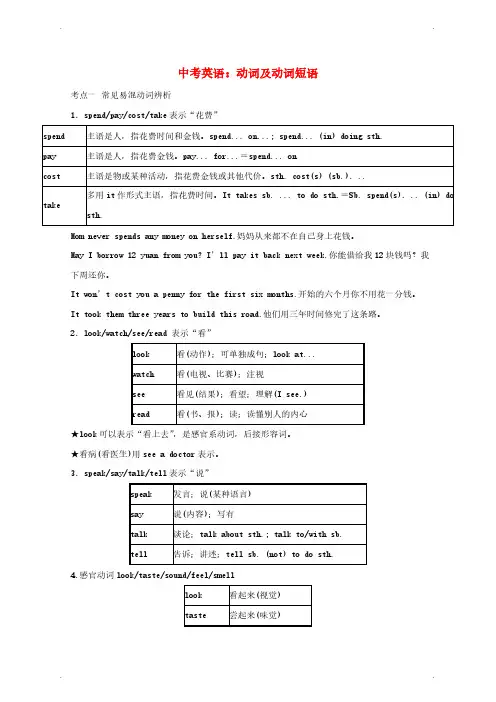
中考英语:动词及动词短语考点一常见易混动词辨析1.spend/pay/cost/take表示“花费”spend主语是人,指花费时间和金钱。
spend... on...; spend... (in) doing sth.pay主语是人,指花费金钱。
pay... for...=spend... oncost主语是物或某种活动,指花费金钱或其他代价。
sth. cost(s) (sb.)...多用it作形式主语,指花费时间。
It takes sb. ... to do sth.=Sb. spend(s)... (in) doin takesth.Mom never spends any money on herself.妈妈从来都不在自己身上花钱。
May I borrow 12 yuan from you? I’ll pay it back next week.你能借给我12块钱吗?我下周还你。
It won’t cost you a penny for the first six months.开始的六个月你不用花一分钱。
It took them three years to build this road.他们用三年时间修完了这条路。
2.look/watch/see/read 表示“看”look看(动作);可单独成句;look at...watch看(电视、比赛);注视see看见(结果);看望;理解(I see.)read看(书、报);读;读懂别人的内心★look可以表示“看上去”,是感官系动词,后接形容词。
★看病(看医生)用see a doctor表示。
3.speak/say/talk/tell表示“说”speak发言;说(某种语言)say说(内容);写有talk谈论;talk about sth.; talk to/with sb.tell告诉;讲述;tell sb. (not) to do sth.4.感官动词look/taste/sound/feel/smelllook看起来(视觉)taste尝起来(味觉)sound听起来(听觉)feel摸起来(触觉)smell闻起来(嗅觉)5.borrow/lend/keep表示“借”borrow借用;borrow sth. from sb.lend借给;lend sth. to sb.keep借用若干时间;keep... for 2 days6.hope/wish/expecthope希望;hope to to sth.; hope+that 从句wish但愿、希望;wish to do sth.; wish sb. to do sth.; wish+that 从句expect期待、期望; expect to do sth.; expect sb. to do sth.7.forget/leaveforget表示“忘记”时,forget通常不能与表示地点的副词或短语连用leave在表示“遗忘”时,通常要与表示地点的状语连用8.hear/listen/soundhear听见;hear+名词(强调听的结果)listen听;listen to+名词(强调听的过程)sound听起来; sound+形容词(强调听的效果)9.wear/put on/dress/be inwear“穿着;戴着”,强调状态,wear后可接穿戴的东西,包括眼镜、首饰等put on“穿上;戴上”,指“穿”的动作,反义词为“take off”“穿衣”,是及物动词,后接人作宾语,意为“给某人穿衣服”;dress onself“打扮;给自己穿dress衣服”be in表示状态,后接衣服,也可接表颜色的词10.reach/get/arrivereach“到达”,是及物动词(比get更正式),其后可直接接地点名词作宾语(不能用介词)get“到达”,不及物动词,之后通常接介词 toarrive“到达”,不及物动词,之后通常接介词 at (一般用于较小的地方)或 in (一般用于较大的地方)1.(2018·山东菏泽单县常青学校模拟三)—I meeting Jack today because I am still angry with him.—Come on, Mary. You are good friends.A.avoid B.expect C.enjoy2.(2018·广东普宁模拟改编)I don’t know the restaurant, but it’s to be quite a good one.A.said B.told C.spoken3.(2018·广西贵港港南二模改编)—How much money did he you yesterday?—500 yuan. I told him I would return it to him in three weeks.A.give B.borrow C.lend4.(2018·甘肃定西中考改编)—I can’t find my English textbook.—Is it possible that you it at home?A.lost B.forgot C.left5.(2018·四川泸州中考改编)It about eight minutes for the light to travel from the sun to the earth.A.costs B.spends C.takes考点二动词短语辨析常考的动词短语辨析有三种:第一种是同一动词的不同搭配;第二种是同一副词或介词与不同动词的搭配;第三种是完全不同的动词短语。
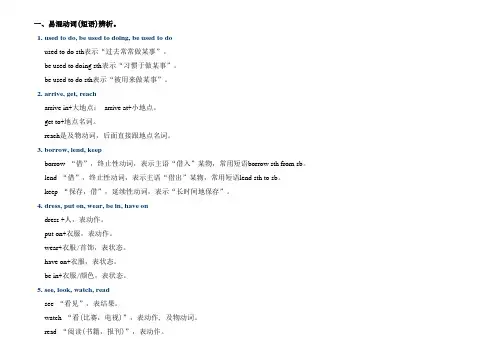
一、易混动词(短语)辨析。
1. used to do, be used to doing, be used to doused to do sth表示“过去常常做某事”。
be used to doing sth表示“习惯于做某事”。
be used to do sth表示“被用来做某事”。
2. arrive, get, reacharrive in+大地点;arrive at+小地点。
get to+地点名词。
reach是及物动词,后面直接跟地点名词。
3. borrow, lend, keepborrow“借”,终止性动词,表示主语“借入”某物,常用短语borrow sth from sb。
lend“借”,终止性动词,表示主语“借出”某物,常用短语lend sth to sb。
keep“保存,借”,延续性动词,表示“长时间地保存”。
4. dress, put on, wear, be in, have ondress +人,表动作。
put on+衣服,表动作。
wear+衣服/首饰,表状态。
have on+衣服,表状态。
be in+衣服/颜色,表状态。
5. see, look, watch, readsee“看见”,表结果。
watch “看(比赛,电视)”,表动作, 及物动词。
read “阅读(书籍,报刊)”,表动作。
look“看”,表动作;不及物动词,后面须加介词才能跟宾语。
6. bring, take, carry, fetchbring“带来,拿来”,表示拿到靠近说话者的地方。
take“带走,拿去”,表示拿到远离说话者的地方。
carry“扛,搬”,用力移动,没有方向性。
fetch“去取,去拿”,表示往返取物。
7. join, take part in, attend 三个词都有“参加”的意思。
join一般指加入党派或组织,如参军,入党等。
take part in 指参加聚会或活动。
attend一般指出席会议。
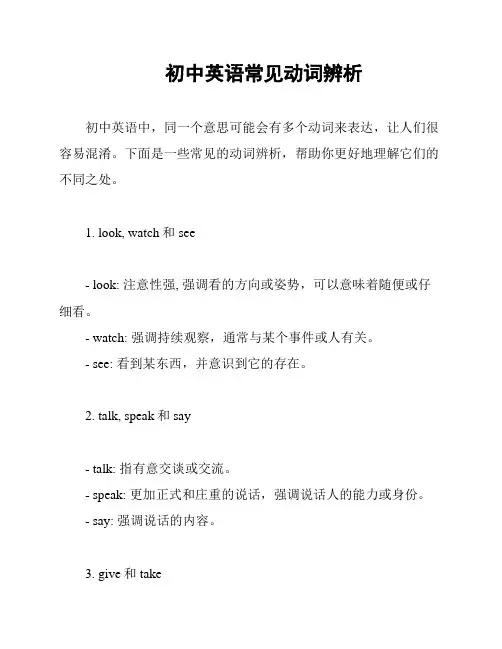
初中英语常见动词辨析
初中英语中,同一个意思可能会有多个动词来表达,让人们很容易混淆。
下面是一些常见的动词辨析,帮助你更好地理解它们的不同之处。
1. look, watch和see
- look: 注意性强, 强调看的方向或姿势,可以意味着随便或仔细看。
- watch: 强调持续观察,通常与某个事件或人有关。
- see: 看到某东西,并意识到它的存在。
2. talk, speak和say
- talk: 指有意交谈或交流。
- speak: 更加正式和庄重的说话,强调说话人的能力或身份。
- say: 强调说话的内容。
3. give和take
- give: 表达主动性,释放或传递给别人。
- take: 表达被动性,获取或接受。
4. buy和purchase
- buy: 常用词,一般指购买任何物品。
- purchase: 更正式的词,指购买高价值物品或商业用品。
5. like和love
- like: 喜欢,表示对某事感兴趣,或者想去做某事。
- love: 爱,表示对某人或某事的深情。
请记住,最好的研究方法是通过实践来掌握这些词汇的正确用法。
希望这些动词辨析可以帮助您在研究英语中更加自信地表达自己!。
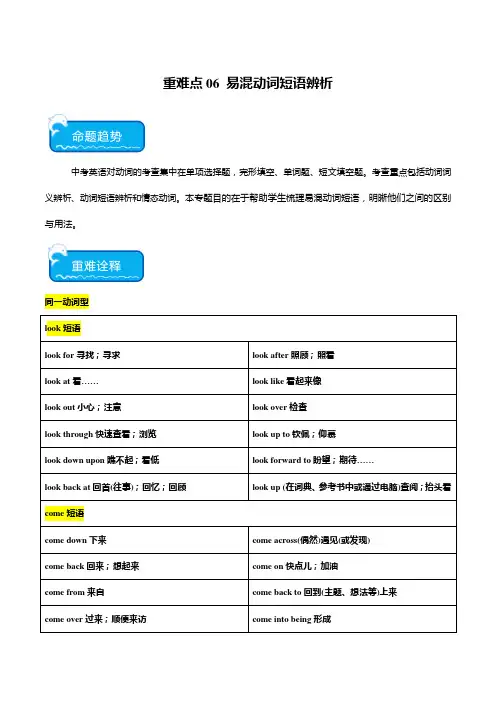
重难点06 易混动词短语辨析中考英语对动词的考查集中在单项选择题,完形填空、单词题、短文填空题。
考查重点包括动词词义辨析、动词短语辨析和情态动词。
本专题目的在于帮助学生梳理易混动词短语,明晰他们之间的区别与用法。
同一动词型look短语look for寻找;寻求look after照顾;照看look at看……look like看起来像look out小心;注意look over检查look through快速查看;浏览look up to钦佩;仰慕look down upon瞧不起;看低look forward to盼望;期待……look back at回首(往事);回忆;回顾look up (在词典、参考书中或通过电脑)查阅;抬头看come短语come down下来come across(偶然)遇见(或发现)come back回来;想起来come on快点儿;加油come from来自come back to回到(主题、想法等)上来come over过来;顺便来访come into being形成同一介词/副词型on短语call on号召;拜访hold on等一等(别挂电话);坚持carry on继续live/feed on以……为食;靠……为生come on快点儿;加油;来吧put on穿上;上演;增加体重,发胖depend on取决于;依靠,依赖try on试穿go on继续,发生turn on打开get on上车;进展;应付;对付over短语come over过来;顺便来访hang over悬挂fall over 绊倒look over (仔细)检查get over克服;恢复;原谅think over仔细考虑go over复习,重温with 短语(dis)agree with (不)同意end with以……结束begin/start with以……开始play with和……玩communicate with与……交流share with和……分享compare with与……作比较catch up with赶上;超过connect with与……相连come up with想出;提出(主意、计划、回答等) deal with解决,处理fall in love with喜欢上,和……相爱(2023中考真题建议用时:15分钟)1.(2023·辽宁鞍山·中考真题)—Could you please tell me where Mr Green is?—Sure. He has ________ for London.A.cut out B.put out C.come out D.set out2.(2023·辽宁朝阳·中考真题)—I don’t know how to ________ the old books.—Why don’t you give them away to the kids in poor areas?A.deal with B.put on C.hand out D.take up3.(2023·内蒙古·中考真题)—Michael, ________ this shirt.—Oh, it looks nice on me.A.throw away B.put down C.take off D.try on4.(2023·西藏·中考真题)—Remember to ________ your glasses before doing eye exercises.—Sure, I will.A.take off B.take up C.put off D.put up5.(2023·四川甘孜·中考真题)We should ________ who broke the door of the classroom yesterday.A.come out B.go out C.find out D.put out6.(2023·湖北襄阳·中考真题)—Shall we go to the nature park this weekend?—Good idea. We can ________ fresh air in the park.A.take up B.take down C.take in D.take off7.(2023·湖北黄石·中考真题)—Everyone should build the good habit of saving food.—I agree, so I always ________ the food I order.A.eat up B.use up C.throw away D.give away8.(2023·内蒙古呼和浩特·中考真题)When you go to a new school this September, you’d better learn how to ________ your classmates.A.catch up with B.get along with C.take care of D.get out of9.(2023·江苏常州·中考真题)—Can you ________ the sign for the community party?—Sure, where should I hang it?A.keep up B.take up C.give up D.put up10.(2023·辽宁阜新·中考真题)Tina ________ her sunglasses on the beach because the sunlight was so strong.A.put up B.put on C.put away D.put down11.(2023·江苏南通·中考真题)The wind energy costs very little and will never ________. Besides, it produces little pollution.A.blow out B.run out C.put out D.break out12.(2023·黑龙江哈尔滨·中考真题)The football game has to be ________ till next Friday because of the bad weather.A.put off B.put on C.put up13.(2023·山东青岛·中考真题)—Are you ready for the show?—No. It’s easy to ________ a play but difficult to act it out.A.make up B.take up C.look up D.put up14.(2023·湖北十堰·中考真题)My friend promised to come to my birthday party. However, he didn’t ________ in the end.A.give up B.cut up C.show up D.pick up15.(2023·江苏徐州·中考真题)I loved the book so much that I could hardly ________.A.put it up B.put it down C.put it on D.put it out16.(2023·辽宁抚顺·中考真题)Ann is ________ her notes for her English exam now.A.paying for B.giving away C.looking through D.putting up17.(2023·吉林长春·中考真题)My friend can always _______ good ideas to solve his problems.A.keep away from B.take care of C.get on with D.come up with18.(2023·江苏泰州·中考真题)Most neighbours ________ the habit of square dancing to create a quieter environment for us.A.get into B.care about C.carry on D.give up19.(2023·四川遂宁·中考真题)—It’s said that ChatGPT has both good and bad sides.—Well, it all ________ how you use itA.leads to B.sounds likeC.turns into D.depends on20.(2023·辽宁·中考真题)While staying in Beijing, the foreigners like to ________ in Beijing hutongs.A.hang out B.bring out C.try out D.set out21.(2023·辽宁营口·中考真题)The smell of the sea ________ memories of his childhood.A.called at B.called off C.called up D.called on22.(2023·四川乐山·中考真题)—What do the letters “CPC” mean in the article?—Don’t you know that, Amy? They ________ “Communist Party of China”.A.search for B.look for C.stand for23.(2023·湖北孝感·中考真题)—Look at the sign. What does it mean?—It means we should ________ the rubbish ________ the proper rubbish bins.A.put; into B.throw; around C.mix; into D.try; on24.(2023·福建·中考真题)I ________ the great scientist from magazines, and I wish to see him some day.A.know about B.look after C.talk with25.(2023·湖北荆州·中考真题)—Jimmy, the bikes you gave away to the poor kids help them a lot. What gave you the idea?—I guess I _______ my father. He always volunteers to help people.A.take after B.look after C.talk back D.turn down1.D【详解】句意:——你能告诉我格林先生在哪儿吗?——当然。
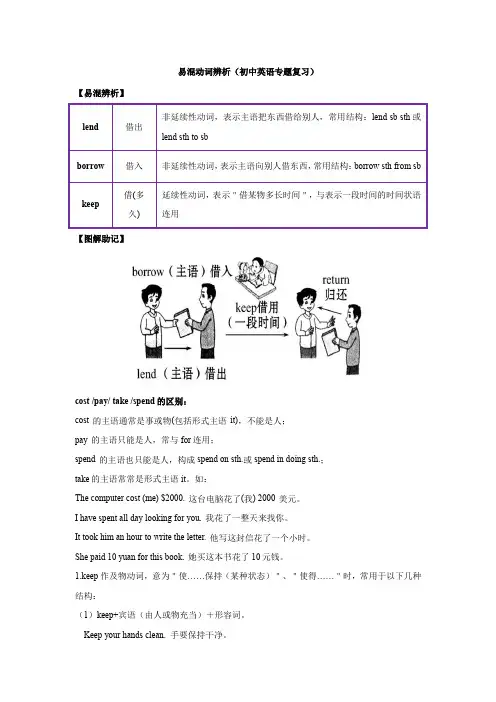
易混动词辨析(初中英语专题复习)【易混辨析】【图解助记】cost /pay/ take /spend的区别:cost 的主语通常是事或物(包括形式主语it),不能是人;pay 的主语只能是人,常与for连用;spend 的主语也只能是人,构成spend on sth.或spend in doing sth.;take的主语常常是形式主语it。
如:The computer cost (me) $2000. 这台电脑花了(我) 2000 美元。
I have spent all day looking for you. 我花了一整天来找你。
It took him an hour to write the letter. 他写这封信花了一个小时。
She paid 10 yuan for this book. 她买这本书花了10元钱。
1.keep作及物动词,意为"使……保持(某种状态)"、"使得……"时,常用于以下几种结构:(1)keep+宾语(由人或物充当)+形容词。
Keep your hands clean. 手要保持干净。
(2)keep+宾语+副词。
What have kept you awa for so long? 什么事使你离开这么久?(3)keep+宾语+v-ing。
I’m sorry to have kept you waiting. 对不起,让你久等了。
(4)keep+宾语+v-ed。
Keep the door clsed. 让门关着。
(5)keep+宾语+介词短语。
Don’t keep your hands in your pockets. 不要把手插在口袋里。
2.keep作及物动词,后接名词作宾语,构成动宾结构,意为"保存"、"保留"、"记(日记等)"、"经营(商店等)"、"遵守(诺言等)"之意。
I keep a diary in English.我用英文记日记。
She keeps a bllkstore.她经营一家书店。
rise/ arise/ raise/ arouse易混難用動詞(一)。
重點提示:1. rise rose risen rising (vi)上升;起立;起床;升官;漲價;聳立;應付2. arise arose arisen arising (vi)發生;起因;起立3. raise raised raised raising (vt)種植;栽培;養育;募捐;提高;舉起;建立4. arouse aroused aroused arousing (vt)提醒;喚起;吸引注意精選例句:1. 太陽從東方升起。
The sun rises in the east.2.新的問題發生了。
A new problem has arisen.3. 這位紳士舉帽向女士們表示敬意。
The gentleman raised his cap in token of respect to the ladies.4. 噪音把她從睡夢中吵醒。
The noise aroused her from sleep.牛刀小試:1. The government authorities ________ many apartment houses for the low-income people.(A) rise (B) arise(C) raise (D) arouse2. The accident on the freeway ________ from careless driving.(A) rose (B) arose(C) raised (D) aroused3. Her pretty attire ________ all the boys.(A) rose (B) arose(C) raised (D) aroused4. The children ________ from their seats to salute the national flag.(A) rose (B) arisen(C) raised (D) aroused5. My suspicion ________ owing to his refusing to tell me the truth.(A) rose (B) arose(C) raised (D) arousedlie /lay易混難用動詞(二)。
中考英语复习易混动词辨析及动词短语归纳1. take、bring 与carry 的区别take 指将某物或某人从这里“带到”或“拿到”某处。
如:Could you take it to the classroom?你能把它带到教室吗?bring 与take 相反,指将某物或某人从别处“带来”或“拿来”。
如:May I bring Tom to see you next Monday?下周一我可以带汤姆来见你吗?carry 指随身携带(背着、扛着、提着、抱着),不表明来去的方向。
如:The box is heavy . Can you carry it?盒子太重了。
你搬得动吗?2. find 、look for 与find out 的区别find 的意思是“找到”,look for 是“寻找”,find out 是经过调查“发现、查明(真相)”。
如:I can’t find my pen . 我找不到我的钢笔了。
He is looking for his cat . 他正在寻找他的猫。
Can you find out who broke the window?你能查明是谁打破了窗户吗?3. forget 与leave 的区别这两个词都有“忘”的意思,其区别如下:forget 常表示“记不起”“忘了要带(买)”,leave 表示“把某物忘(丢)在某地”。
如:I forget his name . 我忘记他的名字了。
He left his gloves on the train . 他把他的手套忘在火车上了。
4. hear 与listen to 的区别hear 与listen to 都有“听”的意思,其区别如下:hear 常表示“听见;听到”,listen to 常表示“倾听(集中注意力去听)”。
易混动词辨析8. speak、say、talk与tell的区别speak、say和talk都含有“说、讲、说话”的意思。
初中英语语法——易混动词用法辨析1.agree with,agree to和agree on*agree with...指“同意某人或某人的意见、观点、决定、方法、安排、说明”等,其后能够是一个名词,也能够是what引起的从句。
如:I don’t agree with you.I don’t agree with what you said.*agree to...是指“同意某打算、建议、或建议”等;后跟动词原形,意为“同意干某事”。
如:Who else will agree to this suggestion besides him?We agreed to start early.*agree on...指在某方面取得一致的看法或意见。
如:We agree on leaving for Beijing the next day.2.answer和reply*answer是常用词,可指口头、笔头,甚至行动回答,有时可与reply 通用。
如:Who can answer the question?Please answer the telephone.*reply较answer正式,既可指用语言、书面作答,也可指用动作或手势作答,常用于正式场合或书面语中,指通过慎重考虑作出的答复。
如:I sent in my application,and the school replied immediately.3.apologize to和apologize for*apologize to sb.相当于say sorry to sb. 表示“向某人道歉”。
如:You should apologize to the old man.*apologize for sb.意为“替某人道歉或认错”。
如:4.argue about和argue with*argue about指“为某事而争辩、争吵”。
如:Don’t argue about the matter any more.*argue with指“为某人争吵、争辩或吵架”。
易混动词辨析一、say;speak;tell;talk1.say“说”,后接所说的话与内容。
1)say+(that)从句2)saysth.tosb.(强调说话的内容)2.tell“1)2)3)4)5)3.1)2)talkaboutsth.谈论某事3)talkwithsb.aboutsth.和某人谈论某事4.speak“说”,主要指说话的行为“发言”或“说某种语言”。
1)speakEnglish说英语sayinEnglish用英语说2)speakatthemeeting在会议上发言(演讲)3)MayIspeakto...,please?(打电话常用语)我可以和……讲话吗?二、look;see;watch;read1.look强调集中注意力“看”这个动作,不强调看的结果,是不及物动词,常与at连用,然后接宾语。
词组:2.see3.4.read指“看书”、“看报”、“阅读”“看文字”之意。
词组:readabook 读书readamagazine 看杂志readnewspaper 看报readaletter 看信三、listen;hear1.listen“听”,指“倾听”,“用心听”,但不涉及听见什么。
不及物动词,如表达“听某人讲”,要用listentosb.。
2.hear“听见”,指声音达到听觉范围,强调听见什么。
四、study,learn1.study主要表示“学习、研究”,指过程2.3.五、1.do2.六、不同之处:1.spend的主语必须是人:1)spendtime/moneyonsth.在……上花费时间(金钱)。
2)spendtime/money(in)doingsth.花费时间(金钱)做某事。
2.cost的主语是物或某种活动,还可以表示“值”:1)sth.costs(sb.)+金钱某物花了(某人)多少钱。
2)(doing)sth.costs(sb.)+时间某物(做某事)花了(某人)多少时间。
初三动词易混点辨析一、专题精讲1. achieve 和 come true的区别achieve 实现(理想、愿望、预言等)及物动词,主语一般为人come true 实现不及物动词组一般由物(理想、愿望、预言等)作主语【及时练习】1 He works so hard that he is sure to___ his dream.2 His prediction of human’s flying to the moon _____.Keys: achieve, came true2. arrive, get 和reach的区别辨析:arrive in +大地点,arrive at+小地点,get to+地点名词,reach是及物动词,后面直接跟地点名词。
e.g. When did you arrive in Beijing?We arrived at the village at five in the afternoon。
How do you usually get to school?When she reached the office, the teacher was having a short rest.【及时练习】1.They arrived ___ London___ a cold winter night.A.at, inB.in, onC.at, onD.in, at2.Those foreign visitors ___ our city the day before yesterday.A.arrivedB.reachedC.reached toD.got in3. Remember to ring me up as soon as you get to London. (同义句)Make ________ to give me a ring as soon as you ________ London.Keys: BB sure reach3. believe, believe in和trust的区别believe 及物动词,有坚定宗教信仰的,相信,信任,认为,信以为真之意,其后直接跟宾语。
易混动词辨析:
一、look, see, read, watch的用法
①look指集中注意力地看,是有意的,强调“看”的动作。
单独使用时,用来
引起对方的注意,如果跟宾语,要和at连用。
Look! Who is swimming in the river? 瞧!谁在河里游泳?
Please look at the blackboard.请看黑板。
Look! The river has risen two feet because of the heavy rain.
②see 用作及物动词,后接宾语,意为“看见”、“看到”,主要强调看的结果,
但不一定是有意识地看。
“看医生、看电影”常用这个词。
I’m looking at the blackboard, but I can’t see the words.我在看黑板,但看不清上面的字。
see a doctor看医生see a film看电影
③read意为“读、朗读”。
表达“看书、看报、看信、看杂志时,通常用read.
他正在读他妈妈的来信。
He is reading the letter from her mother.
不要再阳光下看书。
Don’t read in the sun.
④watch为及物动词,意为“观看、注视”,指非常仔细地、有目的、全神贯注
地“看”。
看电视、看比赛(实验以及各种表演等)习惯上用这个词。
如:
他们正在看足球比赛。
They are watching a football game.他们正在看足球比赛。
不要在阳光下看书。
Don’t read in the sun.
二、say, speak, tell, talk的用法
①say意思是“说、说出、说道”,着重说话的内容,多用作及物动词。
如:
He said thanks to the young man.他们对年轻人说谢谢。
I have something to say.我有话要说。
②speak着重讲话这一动作本身,既可指系统的长篇讲话,又可指简单的开口发音,但不注重说的内容。
The baby is learning to speak.那个婴儿在学讲话。
Our monitor will speak at the meeting.我们的班长将要在会上发言。
③tell常用作及物动词,有“告诉、讲……”的意思。
它既注重说话的内容,
又有告诉的对象,因此tell后常跟双宾语。
常用结构:tell sb sth告诉某人某事;tell sb about sth告诉某人关于某事;tell sb (not) to do sth告诉某人(不)做某事。
He often tells us a story in school.在学校他经常给我们将故事。
④talk侧重于与人交谈时的连贯说话,指双方之间的相互说话。
是不及物动
词,常用结构:talk to/with sb与某人交谈;talk about….谈论/讨论。
I’m talking to a friend.我正在于朋友谈话。
三、spend, cost, take, pay
四个词均有“花费”之意,但用法有区别。
①spend的主语必须是人。
常用结构:sb spend(s) time/ money on sth或sb spend(s)
time (in) doing sth
He spent ten yuan on the book.他花十元钱买了这本书。
I spent two hours finishing the work.完成这项工作我用了两个小时。
②cost的主语是物或某种活动。
常用结构:sth cost(s) sb money
The computer cost me five thousand yuan.这台电脑花了我5000元。
The new sweater cost her fifty dollars.这件毛衣花了她50美元。
③take前常用it作形式主语,真正的主语是其后的不定式。
常用结构:it
takes/took sb some time to do sth.
It took us half an hour to climb the hill.爬上这座花了我们半个小时。
④pay的主语也必须是人。
常用结构:sb pay(s) money for sth
I paid two hundred yuan for the bike.这俩自行车我花了200元。
He paid ten yuan for the boy.他花了10元钱买了这个玩具。
重点提示:
四个“花费”有时可以互换使用,spend, take作“花费时间”讲时常换用;spend, cost, pay作“花钱”时可换用。
It took him two days to visit the Great Wall. = He spent two days visiting the Great Wall.他用两天时间参观了长城。
The old man spent one million on the house. = The old man paid one million for the house. = The house cost the old man one million.那位老人花了100万买了这所房子。
四、arrive、get、reach的用法
三个词均有“到达”之意,但具体用法有别。
①arrive是不及物动词,后接介词in或at,再接表示地点的名词。
arrive at常用
于到达小地方,如车站、码头、邮局或学校;arrive in 常用于到达较大的地方,如国家、州、城市等。
He arrived at the bus station at six.他6点钟到达了汽车站。
I arrived in Tianjin last Sunday.上周日我到了天津。
②get为不及物动词,后接介词to,再接表示地点的名词。
He gets to school at 7:30 every day.他每天7:30到校。
③reach是及物动词,后直接接表示地点的名词。
They reached the station in time yesterday.昨天他们及时到了车站。
Get与arrive后接地点副词(here, there, home),后不需接介词。
五、be made of, be made from, be made by , be made in, be made into的用法
①be made of意为“由。
制成”,介词from后接的制成品能看出原材料。
These wine bottles are made of glass.这些酒瓶是用玻璃做的。
②be made from意为“由。
制成”,介词from 后接的制成品不能看出原材料。
This kind of wine is made from grapes.这种酒是葡萄酒做的。
③be made by意为“由。
制造”by后接制造者。
这个飞机模型是我叔叔做的。
The model plane is made by my uncle.
这个丝绸是手工的。
The silk is made by hand.
④be made in意为“在某地制造”介词in后接表示地点的名称。
这种电视机是南京产的。
This kind of TV set is made in Nanjing.
⑤be made into意为“被制成。
”
这个教室可以被改成一个电脑房。
This classroom can be made into a computer room.。